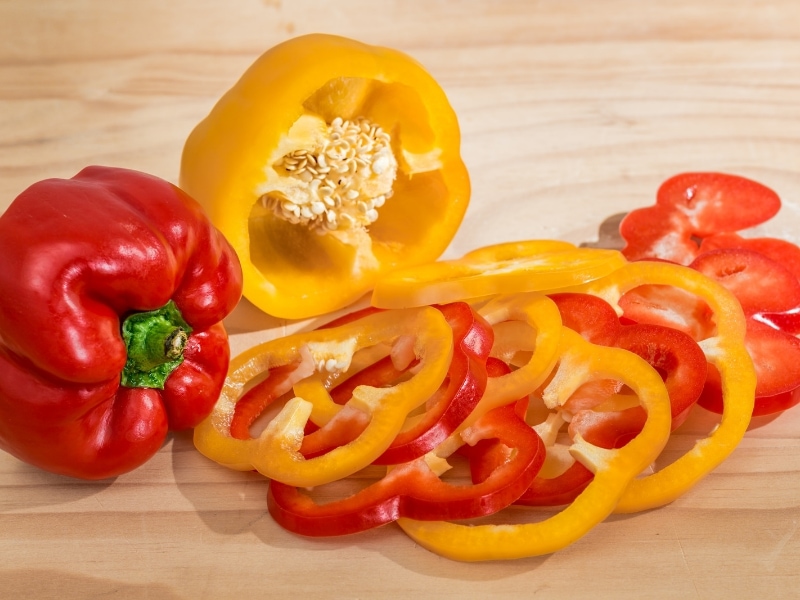What Are the Benefits of Bell Peppers?
Bell peppers are loaded with vitamins, minerals, antioxidants, and fiber, making them an excellent choice for a healthy diet.
1. Rich in Vitamin C (Boosts Immunity & Skin Health)
✔ Bell peppers are one of the best sources of Vitamin C.
✔ A single red bell pepper contains more than 150% of the daily Vitamin C requirement.
✔ Supports immune function, helps in wound healing, and promotes collagen production for healthy skin.
2. High in Antioxidants (Protects Cells from Damage)
✔ Bell peppers contain beta-carotene, quercetin, and luteolin, powerful antioxidants that protect cells from oxidative stress.
✔ Reduces the risk of chronic diseases such as cancer, heart disease, and premature aging.
3. Supports Eye Health
✔ Contains lutein and zeaxanthin, two antioxidants that protect the retina from damage.
✔ Helps prevent age-related macular degeneration (AMD) and cataracts.
4. Promotes Heart Health
✔ Helps reduce inflammation in blood vessels.
✔ Rich in potassium, which helps regulate blood pressure.
✔ Contains fiber that aids in reducing bad cholesterol (LDL) levels.
5. Aids in Weight Loss
✔ Low in calories yet high in fiber, keeping you full for longer.
✔ Contains capsaicin, which may boost metabolism and help in fat burning.
6. Improves Digestive Health
✔ High in fiber, which promotes gut health and prevents constipation.
✔ Aids in healthy digestion and supports a balanced gut microbiome.
7. Helps Reduce Inflammation
✔ Contains anti-inflammatory compounds that may reduce the risk of arthritis and other inflammatory conditions.
8. Good for Pregnancy
✔ High in folate (Vitamin B9), essential for fetal development.
✔ Supports healthy brain and spinal cord formation in babies.
9. Supports Brain Health
✔ Contains Vitamin B6, which helps in neurotransmitter production.
✔ May improve memory, mood, and cognitive function.
Which Color Bell Pepper is the Healthiest?
Bell peppers come in four main colors—green, red, yellow, and orange. While all are nutritious, their vitamin and antioxidant content varies depending on the ripeness and color.
| Bell Pepper Color | Nutrient Profile | Health Benefits |
| Red Bell Pepper | Highest in Vitamin C & Beta-Carotene | Best for immune support, skin health, and heart health |
| Yellow Bell Pepper | High in Vitamin C & Folate | Great for pregnancy, brain health, and digestion |
| Orange Bell Pepper | Rich in Lutein & Zeaxanthin | Best for eye health and reducing inflammation |
| Green Bell Pepper | Lower in Vitamin C, Higher in Fiber | Good for digestion and metabolism but less nutritious than the others |
Which is the best choice?
✔ Red bell peppers are the healthiest because they have the highest levels of Vitamin C, beta-carotene, and antioxidants.
✔ Yellow and orange peppers are great for immune support, pregnancy health, and eye health.
✔ Green peppers are less sweet and have less Vitamin C but are still a good fiber source.
Bell Pepper Nutrition: A Detailed Breakdown
Bell peppers are low in calories but high in nutrients, making them an excellent addition to a balanced diet.
Nutritional Value (Per 100g of Raw Bell Pepper):
✔ Calories – 31 kcal
✔ Carbohydrates – 6g
✔ Fiber – 2.1g
✔ Protein – 1g
✔ Fat – 0.3g
Key Vitamins and Minerals in Bell Peppers:
✔ Vitamin C – 152mg (169% of Daily Value)
- Boosts immunity, promotes skin health, and helps in iron absorption.
✔ Vitamin A (from beta-carotene) – 3131 IU (63% of Daily Value)
- Supports eye health, skin health, and immune function.
✔ Vitamin B6 – 0.3mg (15% of Daily Value)
- Helps in brain function and red blood cell production.
✔ Potassium – 211mg (6% of Daily Value)
- Regulates blood pressure and supports heart health.
✔ Folate (Vitamin B9) – 46mcg (12% of Daily Value)
- Important for pregnancy and fetal development.
✔ Lutein & Zeaxanthin – 51 mcg
- Protects the eyes from age-related diseases.
Bell Pepper Side Effects: Risks of Overconsumption
Although bell peppers are highly nutritious, excessive consumption may cause some side effects:
1. Digestive Issues (Gas & Bloating)
✔ Some people may experience gas, bloating, or stomach discomfort, especially if consumed raw in large amounts.
✔ Cooking bell peppers makes them easier to digest.
2. Acid Reflux or Heartburn
✔ Bell peppers, especially red ones, can trigger acid reflux in people with GERD (Gastroesophageal Reflux Disease).
✔ If you have acid reflux, consume cooked bell peppers instead of raw.
3. Allergic Reactions
✔ Rare, but some people may be allergic to bell peppers.
✔ Symptoms include itching, swelling, or difficulty breathing.
4. May Interfere with Certain Medications
✔ The Vitamin K content in bell peppers may interfere with blood-thinning medications (like Warfarin).
✔ If you take these medications, consume bell peppers in moderation.
5. Pesticide Residue (Non-Organic Peppers)
✔ Bell peppers are on the “Dirty Dozen” list—they may have high pesticide residue.
✔ Always wash thoroughly or buy organic when possible.
How To Store Bell Peppers
Refrigerate whole peppers in the crisper drawer either loose or in a reusable bag. They will last 1-2 weeks stored this way.
Keep the seeds and stem intact when halving peppers. Refrigerate in the crisper drawer up to 1 week.
For sliced, chopped or diced peppers, place in an air-tight glass or plastic container to refrigerate. Consume within 4-5 days.
Freeze whole or cut peppers by vacuum sealing or in ziplock bags. Properly frozen peppers maintain quality for up to 18 months. No blanching needed beforehand.
Excess moisture leads to quicker spoilage, so ensure peppers are dry before refrigerating or freezing to maximize storage life.
What Goes Well With Bell Peppers
Basil, chiles, coriander, corn, garlic, lemon, meat, olive oil, onions, rice, tomatoes.
Substitution
Poblano peppers,Anaheim peppers,Sichuan peppers,Banana peppers

